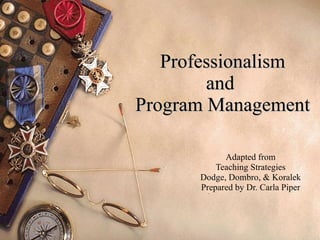
Professionalism
- 1. Professionalism and Program Management Adapted from Teaching Strategies Dodge, Dombro, & Koralek Prepared by Dr. Carla Piper
- 18. Do you learn about each child’s culture, language, family, skills, needs, and interests? Not Often Enough Sometimes Regularly I do this Play and talk with children to learn about their interests and abilities. Collect examples and photographs of work that document children’s skills, interests, and progress. Observe children in different settings and different times of the day. Observe each child regularly and use a recording system that is objective, accurate, and avoids labeling. Communicate with parents often to learn about a child’s family life, culture, home language, and unique characteristics.
- 23. Do you observe and record information about each child’s growth and development? Not Often Enough Sometimes Regularly I do this Record many instances of a young child’s play before drawing conclusions about that child’s abilities, interests, and needs. Observe each child during different periods of the day: arrival, indoor and outdoor play, meal, naps, and departure. Ask parents for information about what their child is like at home and use that information as you interpret observations. Record infants’ and toddlers’ behavior in an objective, accurate way and avoid the use of labels. Watch and listen to young children and write down what they do and say to learn more about their needs, skills, and interests.
- 25. Do you work as a member of a team to plan an individualized program? Not Often Enough Sometimes Regularly I do this Use creative thinking skills such as brainstorming in planning and in solving problems. Know social services, health, and education resources in the community or region and use them as needed. Acknowledge the strengths of other team members: other caregivers, aides, parents, and volunteers. Work with other center staff to provide input on program issues.
- 26. Do you work as a member of a team to plan an individualized program – continued? Not Often Enough Sometimes Regularly I do this Evaluate the program constantly to help plan for the future. Plan the environment, daily activities, and special activities to meet the needs of individual children. Use information from parents to learn more about who children are. Use information gained through observing to get to know children as individuals. Meet regularly with other caregivers to plan developmentally and culturally appropriate activities for the group.
- 31. Do you follow administrative policies and procedures? Follow the center’s system for reports and recordkeeping. Not Often Enough Sometimes Regularly I do this Review memorandums and other documents to keep informed about caregivers’ job responsibilities. Complete management tasks according to a schedule. Review center policies before starting a new task. Know and understand responsibilities as outlined in staff and parent handbooks.
- 32. Do you continually assess your own performance? Not Often Enough Sometimes Regularly I do this Accept and address feedback and criticism from parents, colleagues, and supervisors. Ask colleagues to observe me and provide objective feedback Analyze my skills to identify areas in need of improvement. Compare my performance against the recognized standards of the early childhood profession. Compare my performance against the center’s procedures and guidelines.
- 33. Do I applying professional ethics at all times? Not Often Enough Sometimes Regularly I do this Support other teachers when they need assistance. Support early childhood education practices that are developmentally appropriate. Speak out when childcare practices are not appropriate. Carry out my duties in a dependable and reliable way. Keep information about children and their families confidential.
- 34. Do I apply professional ethics at all times - continued? Not Often Enough Sometimes Regularly I do this Take care of my personal physical, emotional, social, and intellectual needs. Support the center director and other administrative staff by avoiding gossip. Believe in an honest, reliable, and dependable manner in performing duties. Treat each child as an individual and show no bias because of culture, background, abilities, or gender.
